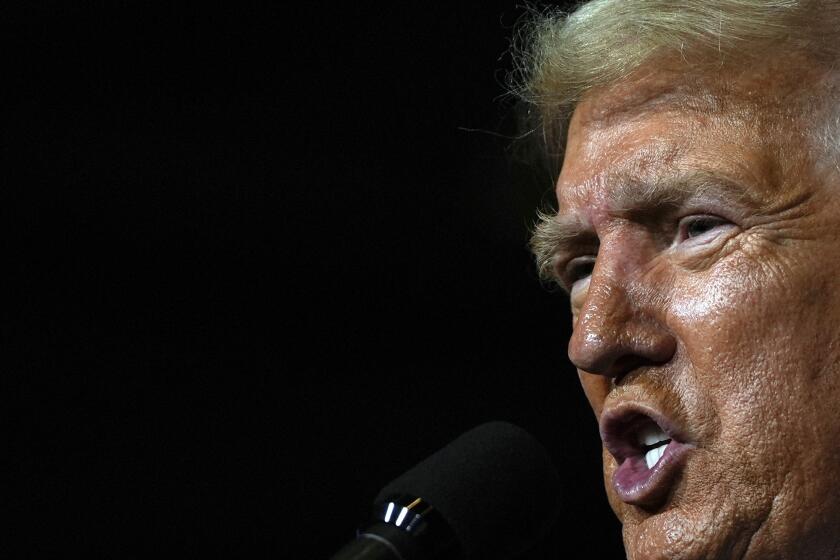U.S. Vision Must Focus on Our Hemisphere
This week, the president will travel to Mexico, Costa Ricwa and Barbados, the first of three trips to Latin America and the Caribbean during the next year. Some Americans may treat these as a small diversion in a larger season of home-grown political fights. But if they do, they will miss a key element of President Clinton’s foreign policy that is essential to our own well-being as Americans: strengthening the historic trend toward democracy, security and prosperity in our own hemisphere.
This intense focus on the Americas comes at a unique moment in time. Of all the remarkable changes that have occurred in our world within the past decade, none is more striking--or less noted in this country--than what has taken place in our own hemisphere. With quiet and steady progress, the people of the Americas have forged a new set of realities, laying a firm foundation for the future. They have chipped away at the last vestiges of militarism, while instituting human rights protections and the rule of law. They freely choose their own leaders in every nation but one. They have overturned discredited dependencia economic theories with aggressive privatization and open courting of foreign trade and investment.
But though the trends are positive, our hemisphere remains in delicate transition. Difficult challenges that demand joint effort threaten the new-found stability and freedom of the region: narcotics trafficking and money laundering, uneven wealth distribution, migration pressures and corruption. And while the foundation of political and economic reform is taking place, we must still prove that open markets and democracy deliver for the people of the Americas--a task the hemispheric leaders set for themselves at the 1994 Summit of the Americas.
President Clinton has embarked upon a comprehensive strategy of the hemispheric engagement because it is clearly in our national interests to help our neighbors lock in the gains of democracy and open markets.
Politically, democracies are less likely to threaten the security interests of the United States. They follow norms of international behavior consistent with U.S. interests; Argentina and Chile have contributed to U.S.-led efforts in Bosnia and Iraq, while the hemisphere has come together to resolve “in-house” challenges to democracy in Haiti, Paraguay, Guatemala and elsewhere. Democracies provide an outlet for political expression within a stable environment, as shown by El Salvador’s recent elections which resulted in dramatic gains for the former guerrillas. Ecuador demonstrates how democracies refuse to tolerate corrupt activities and governments. And Costa Rica shows how they encourage a more equitable distribution of resources, respect for worker rights and concern for the environment.
Economically, the case is equally compelling. Let’s look at the facts and what we stand to lose without continued engagement.
* We export more to the hemisphere than anywhere else; almost 40% of every export dollar is earned in Latin America and the Caribbean.
* Our hemispheric neighbors already import as much from the United States as from Japan and Germany combined; by 2010 they will import more from the United States than Japan and the European Union combined.
* Even with temporary setbacks, such as Mexico’s peso crisis, foreign investment continues to pour in.
California’s exports to Latin America and the Caribbean have been rising on average 20.9% per year between 1993 and 1995, the latest figures available. Its $9.1 billion in 1995 exports ranked it third among U.S. states and provided 137,000 Californians with paychecks every day.
The potential for future U.S. exports, jobs and income from trade within the Americas is extraordinary. More than half of all Latin Americans are under 17, representing a huge consumer market for U.S. goods.
In a world where trade, investment and economic growth will increasingly dominate, we simply can’t afford to allow our natural markets to become others’ captive markets. Unless we engage actively, obtaining all appropriate authorities from Congress, including fast track to support trade expansion leading to the Free Trade Area of the Americas, we stand a chance of being relegated to second status in a region that might otherwise support our prosperity for years to come.
Just as an earlier generation of visionaries rose to the challenge history at the end of World War II using trade and economic integration to strengthen fragile democracies and ward off hostile political systems in Europe and Japan, now we must chart a similar course. If we build on the foundation already laid--locking in democratic gains, spurring economic integration and trade, decreasing the inequitable distribution of wealth and finding common solutions to common challenges--we will complete the historic journey of the Americas away from dictatorship, war and command economies.
So in Clinton’s upcoming travels to Mexico, Costa Rica and Barbados, his plane will be headed southward, but his true goal lies here in the United States. For a free democrativ, prosperous hemisphere is no less important to Americans than it is to the rest of the Americas.
More to Read
Sign up for Essential California
The most important California stories and recommendations in your inbox every morning.
You may occasionally receive promotional content from the Los Angeles Times.










